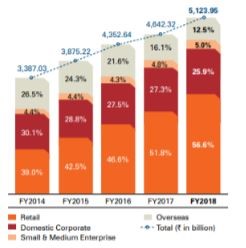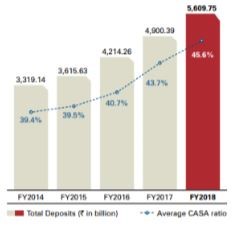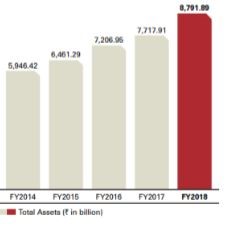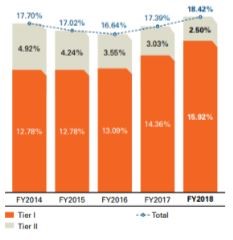Research Report highlighting Historical Forces of ICICI Bank Sample Assignment
Introduction
This interim report associated with the case of the assignment at hand shall need to correlate and associate with the case of the topic of corporate governance failure at the ICICI Bank. That evoked a great deal of details that encompassed the organization’s entire history. It included the distinction between ICICI Limited as a whole financial institution and the ICICI bank as its noted subsidiary, the latter of which experienced a great deal of growth, and was ultimately publicly traded (Parameswar, Dhir & Dhir, 2017). A noted observation in that regard was ICICI offering a diversified collection of financial services and products at large (Singh & Tandon, 2012). Eventually, the entire affair of relations between parent and subsidiary merged to formulate a whole banking organization that was related to all things that constituted in terms of determining the results and consequences.
The effective coalescence of business, government and society is an altogether essential one since it implies the manifestation of a dynamic environment. This review shall exceptionally account for, analyze and evaluate the details of ICICI Group in terms of all the deep and relevant historical forces (Tuli, Khatri & Yadav, 2012). Along the way, the details that are to be unearthed and presented shall constitute and project exceptionally with respect to the manifestation along the lines of presenting justification and credence with respect to the happenstances, decisions and ordeals, which extend all along the available time period of the company’s existence (Parameswar, Dhir & Dhir, 2017). The possibilities of scenarios shall be modelled as per the assumptions regarding how continuation of certain current trends might manifest or unwind. All in all there are nine notable deep historical forces that exist in reference to the entire case of ICICI Group (Singh & Tandon, 2012), especially its association with notable external environments that accounted towards situations manifested both in favor or in opposition respectively.

Figure 1. Total Advances in ICICI Bank. (Source: Parmar, 2014)
Industrial Revolution
In the viewpoint from the perspective of human history in general, the underscoring of importance with regards to the encompassing and wide reaching conditions of the Industrial Revolution. These include capital, labor, natural resources, strong markets, ideas and supporting institutions at large, which shall encompass many conditions for the overall case of actual economic growth (Parmar, 2014). In reference, the origins of ICICI Bank in 1994 could be seen as a result that indirectly caused as the Indian economy got liberalized, and as a result, privatization experienced highly accelerated growth (Tuli, Khatri & Yadav, 2012). Banking institutions like it certainly experienced a robustly growing economy as well as the large scale generation of capital to the extent that it actually started engaging with it, most prominent among which was its initial operations of providing finances to different industrial and business projects respectively (Singh & Tandon, 2012). However, it is necessary to highlight that large scale corporate measures were actually a result of significant shifts and crisis in the economy (Tuli, Khatri & Yadav, 2012). Ultimately, they all sought to undermine the interests because of having a myopic vision from corporate governance.

Figure 2. Total Amount of Deposits in ICICI Bank. (Source: Tuli, Khatri & Yadav, 2012)
Inequality
This historical force accounts for the notion that inequality is simply ubiquitous, which highlights the association with distribution of wealth, education, health etc. In the context of ICICI Bank, this inequality becomes of greater consequence since they are associated with a significant impact upon the economy, which it eventually achieved through growth and diversification in the finance industry (Parmar, 2014). Its recognition by the Reserve Bank of India as a systematically essential bank ensures its continued influence and impact across the entire order, which extends to industries and widespread markets (Parameswar, Dhir & Dhir, 2017). When the global recession’s effects were most manifested, ICICI saw fit to shift its strategies from retail businesses primarily to corporates, which is certainly a very significant issue altogether (Singh & Tandon, 2012). Moreover, its encounter and decision to lose provision defaults on its loans, which it sees completely adequate in terms of the ratio between good versus bad loans respectively.
Population Growth
Population growth directly associates with effective forces and impacts, which induces and details all possible details and factors that seem to encapsulate and detail economic growth as they have been mentioned above. They are all completely relevant and consequential with respect to the trade-offs that ICICI Bank would have to achieve and decide all across the board (Parmar, 2014). This is notable because of the growing population of youth in terms of rates over years in its home country (Parameswar, Dhir & Dhir, 2017), which certainly implies greater engagement and reach for the firm at large with regards to its offering as well as its future plans.

Figure 3. Total Assets of ICICI Bank. (Source: Parameswar, Dhir & Dhir, 2017)
Technology
The notion of technology is extremely relevant and consequential to the point of implying the notions of transformations in the order and trends of various aspects of business operations and processes at large (Goyal & Joshi, 2012). They are all extremely relevant and consequential with respect to extensive realization and projection that would highlight acceptable notions (Singh & Tandon, 2012). ICICI Bank has satisfied all these aspects quite acceptably.
Globalization
In terms of being present and so closely associated with one of the world's fastest growing economies, it is apparent that ICICI Bank’s interdependence of conjugation regarding forces and associations run in every direction (Goyal & Joshi, 2012). They are all extremely appropriate regarding the significant points of consequence and implication that the organization brings to the table regarding its partnerships, relationships as well as through representations (Singh & Tandon, 2012). They are all relevant with respect to the decisions that have been made regarding its status and value related to all possible offerings at large (Parameswar, Dhir & Dhir, 2017). The consequential point in concern must also relate to scandals and issues like the ‘conflict of interest’ allegations, which have been made against it at large.

Figure 4. Capital Adequacy Ratio in ICICI Bank. (Source: Parameswar, Dhir & Dhir, 2017 )
Nation-States
As of this point in time, it is evident that ICICI Bank places a greater degree of corporate governance importance to nation-states interests instead of looking at the globalization factors and challenges across the board. The evidence relating and correlating with the country of India seems exceptionally important (Parameswar, Dhir & Dhir, 2017). Perhaps the most obvious example of this occurring manifests in the ‘conflict of interest’ loan of 3250 crore INR, which was made with respect to reported. Moreover, the actions that were levied by the government authorized by SEBI (Goyal & Joshi, 2012). Every indication seems to point to favorability in terms of the greatest advantages that occur and portray regarding the entire case.
Dominant Ideologies
Under all considerations, things are quite evident that ideologies that have seemingly affected largely tend to occur across some notable lanes that the company has aimed at consolidating. They are all extremely beneficial and consequential to the point of manifesting plans, measures and actions all across the board (Parameswar, Dhir & Dhir, 2017). However, they are liable to noted changes all across the board (Goyal & Joshi, 2012). There seems to be a constantive adherence to capitalism with full force as the underlying dominant ideology, which has served to direct and control its actions all across the board.
Leadership
The historical precedence showcases that there is seemingly a greater focus given at the management level than what is provisioned at the corporate level. This has distinctly created the ‘conflict of interest’ controversy in actuality (Parameswar, Dhir & Dhir, 2017). However, looking at the results, as well as the strategic directions that its leaders have taken at important points, it is apparent that they must have manifested poorly quite recently.
Chance
Chance could occur at any time, and it might manifest in many different formats and approaches (Singh & Tandon, 2012). However, with regards to ICICI Bank, it is apparent that they have not manifested in very obvious ways to be completely accounted for.
Conclusion
The notion of historical forces have gone a great deal in explaining the exact circumstances, and have shined a great deal of contexts to poor and failing corporate governance at large. They are all consequently relevant in terms of backgrounds and reasons that have expanded and manifested accordingly.
References
Goyal, K. A., & Joshi, V. (2012). Merger and acquisition in banking industry: A case study of ICICI Bank Ltd. International Journal of Research in Management, 2(2), 30-40.
Parmar, R. (2014). Non Performing Assets (NPAs): A Comparative Analysis of SBI and ICICI Bank. International Journal for Management and Pharmacy, 3(3), 68-72.
Parameswar, N., Dhir, S., & Dhir, S. (2017). Banking on innovation, innovation in banking at ICICI bank. Global Business and Organizational Excellence, 36(2), 6-16.
Singh, A. B., & Tandon, P. (2012). A study of financial performance: A comparative analysis of SBI and ICICI Bank. International Journal of Marketing, Financial Services & Management Research, 1(11), 56-71.
Tuli, R., Khatri, A., & Yadav, A. (2012). A comparative study of customer attitude towards ATM of SBI and ICICI bank. International Journals of Marketing and Technology, 2(8), 463-475.


